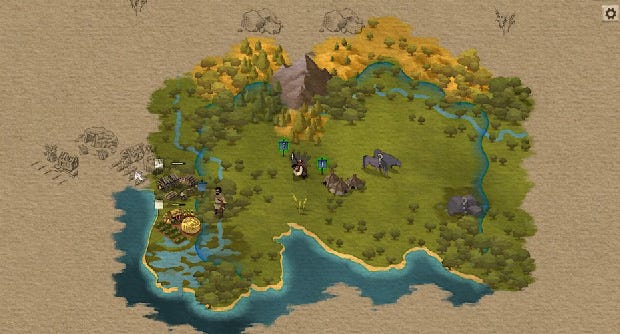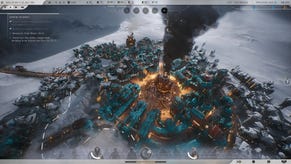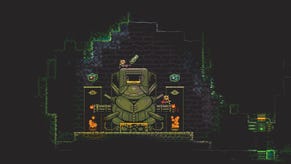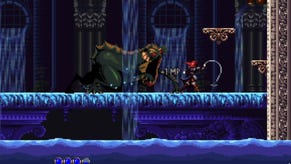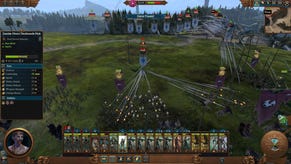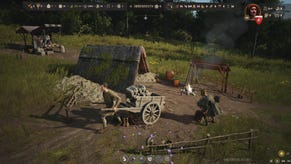At The Gates is a 4X game that learns from RimWorld and Spelunky
Make it different every time
Jon Shafer has joined Paradox to found and lead a new team and make a new strategy game, but work continues on At The Gates, the project Shafer has been developing independently for years now. It's a 4X game that casts off many of the recognisable patterns of the genre. Instead of building an empire, you control a barbarian tribe trying to tear down an empire, or to co-exist alongside that empire. In this case, it's the Roman empire. To survive, you'll need to exploit resources, move with the seasons, and build a relationship with the world as well as your neighbours and companions.
At The Gates has been a long time in the making. Kickstarted for just over a $100,000 in 2013, it's the first project of Shafer's Conifer Games studio, founded following his work at Firaxis on Civ IV and V, and a stint at Stardock. Shafer believes that strategy design often requires iteration after iteration to find the best version of an idea, or even to find the right idea. With At The Gates this has involved finding the character of the tribes and their members, as well as bringing the map to life as a character in and of itself.
Seasonal change plays a big part in the game. Tactically, the alterations to the map that come with the passage of time can open up new options for attack or retreat as snows thaw or rivers freeze over, and the resources available shift with the weather. Since its announcement and Kickstarter, I've seen At The Gates as a response to Shafer's work on Civ V; an intricate slice of history as dessert after Civ's main course. I put that idea to Shafer at the recent PDXCON, where we also talked in-depth about his wider approach to design and his work on Civ V.
"Yes, exactly! At The Gates is my version of these ideas", he replied. "And, yes, it's something that I'm still working on and it's definitely going to be finished and released. But it won't be a Paradox game. Here at Paradox I'm ramping up, building a new team, starting a new project. We're still in the idea phase. When I go home on weekends, and the rest of the time, I'm doing programming and iteration on At The Gates. It actually works out kinda nice because at Paradox I don't need to be super hands-on with the programming or really in the thick of it, so I get that aspect of development from At The Gates. It's almost like having a day job and a hobby, both of which are equally important."
I've noticed while talking that Shafer has a habit of talking about one idea, and then following up with another idea that either builds on it or runs somewhat contrary to it. I ask him if his approach to game design involves formulating responses and reactions to the games he's currently playing, or that he's worked on in the past.
"That's always going to be the case. Everything influences everything. For example, in At The Gates, the characters - the clans - are in a lot of ways inspired by games like Crusader Kings II and King of Dragon Pass where you have individuals that spice up the game. In part that was a response to playing the game as I'd been building it and realising that because you move your tribe around rather than staying in one place, you don't get to build infrastructure and settlements that become your stamp on the map. You're not leaving that trace of yourself on the map in the form of a kingdom or an empire.
"With that missing, I realised the game wasn't all that much fun and I needed to add something else. That was the character system. So the characters are a direct response to a problem that I encountered in the design, but they are also inspired by other games I'd been playing. And of course I put my own twist on it all. Another aspect in At The Gates comes from Imperialism. So the surveying system, where you would uncover resources in that game was kind of micro-managey. It got kind of tedious, but the idea of searching the map trying to find something cool seemed like a good thing to grab onto.
"So in At The Gates, when you first find a resource out in the world, you don't know what it is. I call that being 'shrouded'. You then need to send a unit to identify what it is. It's basically a multi-tiered exploration system. At first you might know that it's a mineral, but then in the second layer you need to get someone close up to figure out what it is so you can use it. It's like a second hit. The first one is the discovery, the second is the unveiling."
This idea of a 'second hit' seems relevant to one of my main criticisms of strategy games as a whole and 4X games particularly. There are often rewards, doled out to keep the player invested in the game, but after a while they become part of a few repetitive loops. Fill the construction bar to improve the city, fill the settler slot to found a new city, break down the walls to hurt the enemy. By the end of a long game, you've been completing the same loops to get the same rewards over and over again.
"Yes, that is a huge thing and it's something I think about a lot, not just in At The Gates but for all the future games that I work on. I'm going to be tackling that precise thing in a very direct way."
His approach to this problem hasn't been informed solely by strategy games though: "A lot of the games I play now are more roguelikes: The Binding of Isaac, Spelunky, RimWorld, Don't Starve."
"They have strategic elements to them but they're very different when it comes to what you were talking about with the loops. You don't unlock the same technology every time, or a building that does the same every time. I want to add more, as those games do - new things to discover so that you don't hit the same beats at the same time on every playthrough.
"In At The Gates you might find a shrouded mineral but when you reveal it, you might just get an iron deposit that lets you build some weapons or tools, but it could be a huge gold deposit that completely changes your game. They're rare, but they exist. It's not always going to a basic mineral - there's a bigger spread of things that can happen."
Everything else has roguelike elements these days (except maybe sports games - give me a roguelike football game, please, thanks) so why not a hardcore historical strategy game? It seems like a sensible step, bringing the unexpected to the journey through history. There's more to At The Gates than a set of slightly unusual inspirations though. It might also be the meeting point of Civilization and Crusader Kings, a game that is tied to 4X conventions but interweaves them with roleplay and interactions between characters. In our interview, Shafer said that the great opportunity for strategy games lay in their use of characters. After years in development, At The Gates might be primed to seize that opportunity.
